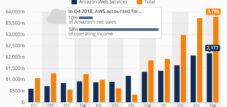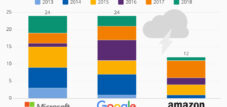AWS European Sovereign Cloud in Brandenburg: Amazon's response to European digital sovereignty
Xpert pre-release
Language selection 📢
Published on: June 5, 2025 / update from: June 5, 2025 - Author: Konrad Wolfenstein

AWS European Sovereign Cloud in Brandenburg: Amazon's response to European digital sovereignty - Image: Xpert.digital
AWS reveals European Sovereign Cloud - data protection and control in focus
Brandenburg becomes the center of Amazon's visionary SOEUGECN Cloud Initiative: AWS starts European cloud offensive
In June 2025, Amazon Web Services unveiled the long-awaited governance structure for the AWS European Sovereign Cloud, an ambitious project that reacts to growing European concerns regarding digital sovereignty and data protection. This initiative has been the most extensive effort to create a completely European-controlled cloud infrastructure that operates independently by the parent company Amazon. With a planned investment of 7.8 billion euros by 2040 and the headquarters in Brandenburg, the Sovergägn Cloud is scheduled to start operating at the end of 2025. The emergence of this separate European cloud infrastructure reflects the increasing transatlantic tensions in the area of data protection, in particular against the background of the US Cloud Act and political developments under the new Trump administration, which have motivated European companies and governments to search for data protection-compliant alternatives.
Suitable for:
- Depending on the US cloud? Germany's struggle for the cloud: How to compete with AWS (Amazon) and Azure (Microsoft)
Governance structure and operational independence
AWS has developed a complex European organizational structure for the European Sovereign Cloud, which aims to ensure complete operational autonomy from the American parent company. The new structure includes a parent company registered in Germany and three specialized subsidiaries that cover various aspects of the cloud company. Kathrin Renz, who is currently working as a Vice President of AWS Industries, will be the first managing director of the new European company and will thus establish a purely European management level.
Operational control is carried out exclusively by EU citizens with residence in the European Union, which is a fundamental difference to conventional AWS regions. In addition to the managing director, the management team will include a representative for security and data protection, both must be a residence in the EU. This personnel strategy extends to all operational levels, including data center management, technical support and customer service, which ensures that no surgical control is exercised outside the EU boundaries.
An independent advisory board is established as an additional governance layer, which is legally obliged to act in the best interest of the AWS European Sovereign Cloud. This advisory board consists of four members, all EU citizens residing in the EU, although at least one member must be independent of Amazon. The advisory board acts as an expert committee and guarantees an obligation to account in sovereign aspects of the cloud operation, including security and access controls as well as the ability to operate independent surgery in the event of disorders.
The technical architecture of the AWS European Soverägn Cloud is designed to continue working indefinitely, even in the event of interruptions in connectivity between the European Sovereign Cloud and the rest of the world. Authorized AWS employees of the European Sovereign Cloud, which are based in the EU, are given independent access to a copy of the source codes that are necessary to maintain services under extreme circumstances. This technical autonomy is supported by its own network infrastructure, which provides European providers via AWS Direct Connect Connectivity.
Technical infrastructure and security measures
The AWS European Soverewn Cloud will have a completely autonomous technical infrastructure that is physically and logically separated from other AWS regions. A central component of this infrastructure is a separate Amazon Route 53 system, which offers customers a highly available and scalable domain name system (DNS), domain registration and web services for availability and state monitoring. The Route 53-Names server for the European Sovereign Cloud will only use European top levels (TLDS) for their own domain names, which is another level of technical sovereignty.
A particularly important aspect of technical independence is the establishment of its own European “root-certificate authority” (approx.). This certification body enables key material, certificates and identity check for SSL/TLS certificates to be operated entirely autonomously within the AWS European Sovergn Cloud. This eliminates dependencies on external certification sites and strengthens the cryptographic sovereignty of the platform.
The security architecture is reinforced by its own security operations center (SoC), which reflects global AWS security practices under completely European control. This SoC is directed by its own head of security that must be a residence in the EU. The security manager is responsible for advising the management and supporting customers and regulatory authorities in Europe in security -related matters.
To fulfill customer requirements, AWS introduces the sovereign requirements framework (SRF), a comprehensive catalog of technical, legal and operational sovereign controls. The SRF is based on sovereignty expectations of customers, requirements of EU regulatory authorities, guidelines of leading industry standards and the needs of implementation partners. Customers receive access to test reports via AWS Artifact that ensure complete traceability of the control design and operational effectiveness.
Suitable for:
Financial investments and economic effects
Amazon has announced a considerable financial commitment for the AWS European Sovereign Cloud, with planned investments of 7.8 billion euros by 2040 to the German region of sovereign cloud, which will be located in Brandenburg. This amount of investment not only reflects Amazon's strategic commitment to the European market, but also the recognized need to react to the growing sovereignty requirements of European customers.
The economic effects of this investment are expected to go far beyond direct capital supply. Amazon predicts a multiplier effect that is intended to contribute up to 17.2 billion euros to the gross domestic product by 2040. This expected economic benefit is based on the assumption that the digital transformation of administration and companies is promoted and the AWS partner network is strengthened.
The employment effects are also significant: the project should create 2,800 full-time positions at regional companies, in particular in the areas of construction, maintenance, engineering, telecommunications and the wider regional economy, which are part of the supply chain for AWS data centers. In addition, AWS plans to create new bodies for highly qualified specialists such as software developers, system engineers and solution architects, which will be responsible for the establishment and operation of the AWS European Cloud.
The investment strategy also underlines Amazon's commitment to sustainable projects because the company plans to advance projects on renewable energies and to achieve positive effects in the communities in which AWS is present. This holistic approach to regional development reflects an understanding that successful cloud infrastructure not only requires technical excellence but also social integration.
🎯📊 Integration of an independent and cross-data source-wide AI platform 🤖🌐 for all company matters

Integration of an independent and cross-data source-wide AI platform for all company matters-Image: Xpert.digital
Ki-Gamechanger: The most flexible AI platform-tailor-made solutions that reduce costs, improve their decisions and increase efficiency
Independent AI platform: Integrates all relevant company data sources
- This AI platform interacts with all specific data sources
- From SAP, Microsoft, Jira, Confluence, Salesforce, Zoom, Dropbox and many other data management systems
- Fast AI integration: tailor-made AI solutions for companies in hours or days instead of months
- Flexible infrastructure: cloud-based or hosting in your own data center (Germany, Europe, free choice of location)
- Highest data security: Use in law firms is the safe evidence
- Use across a wide variety of company data sources
- Choice of your own or various AI models (DE, EU, USA, CN)
Challenges that our AI platform solves
- A lack of accuracy of conventional AI solutions
- Data protection and secure management of sensitive data
- High costs and complexity of individual AI development
- Lack of qualified AI
- Integration of AI into existing IT systems
More about it here:
European sovereign cloud: a bulwark against the US Cloud Act?
Legal background: US cloud act and transatlantic tensions
The necessity of a European Sovereign Cloud is deeply rooted in the legal conflicts between US and European data protection legislation, in particular the US Cloud Act (Clarifying LawFul Overseas of Data Act) adopted in 2018). This law allows US law enforcement authorities to access data that is controlled by US companies, regardless of where this data is physically stored. This extraterritorial range is in fundamental conflict with the European General Data Protection Regulation (GDPR), in particular with its provisions for international data transfers.
The Cloud Act enables US authorities to request the publication of data by court resolutions (warrants or subpoenas) of US telecommunications providers and cloud service providers, even if this violates the state's laws in which the data is stored. This regulation creates considerable legal uncertainty for globally operating companies that are confronted with contradictory legal requirements.
The problem has already been anticipated by historical precedents such as the Patriot Act. As early as 2012, researchers from the University of Amsterdam warned that European data in the “cloud” could be viewed by US law enforcement and intelligence agencies despite European data protection laws. The Foreign Intelligence Surveillance Amendments (FISA) Act makes it particularly easy to avoid local government institutions and to gain direct access to cloud data from non-Americans outside the United States, with minimal transparency obligations.
In 2019, the European Data Protection Committee (EDPB) and the European Data Protection Officer (EDPS) emphasized that Article 48 of the GDPR requires that every order of a non-EU authority for the transfer of personal data outside the EU must be recognized by an international agreement in order to be valid. Accordingly, EU companies should basically reject direct inquiries and refer the requesting third-party authority to existing legal assistance agreements.
Political developments and increased sovereign efforts
The political developments in the United States under the new Trump administration have significantly tightened the existing transatlantic tensions in the data protection area. A particularly problematic signal was the discharge of three democratic members of the Privacy and Civil Liberties Oversight Board (PCLOB) by President Trump on February 3, 2025. This decision has a direct impact on the Transatlantic Data Privacy Framework (TADPF), which regulates the legal data transfer between the EU and the US The task of monitoring US intelligence agencies can no longer perform.
Experts warn that this could only be the beginning of a series of measures that endanger the entire tapf. Executive commands on which the framework is largely based could be revoked in the coming weeks. This development particularly affects companies and institutions that rely on US cloud services and illustrates the vulnerability of transatlantic data protection agreements to political changes.
The fundamental legal conflict between the cloud act and European data protection regulations remains and is still exacerbated by political developments. While the EU has created a comprehensive legal framework with the GDPR, which anchors the protection of personal data as a fundamental right, US data protection is still based on a patchwork of sectoral regulations and self-commitments of companies.
These political realities have caused European companies to rethink their dependence on US cloud services. The AWS European Soverewn Cloud can be understood as a direct answer to these challenges, since it creates a technical and legal structure that meets European data protection requirements without relying on US-based infrastructure or governance structures.
Critical evaluation and remaining challenges
Despite the comprehensive measures to create a European confident cloud infrastructure, there are fundamental questions regarding the complete independence of US law influences. The AWS European Sovereign Cloud could also affect the problem of extraterritorial application of US laws mentioned in the query, since Amazon, as a US company, is basically subject to US judiciary.
The application of the cloud act to EU companies depends on whether they have sufficient connections to the USA. This can be the case through US legal persons, a foreign unit with an office in the USA or a foreign unit with sufficient contacts in the USA, which meet the requirements of personal jurisdiction. Although the AWS European Soverter Cloud is structured as a separate German society, the parent company Amazon could continue to be interpreted as a connection to the USA.
Another critical aspect is the question of technological dependency. Even if the operational control is completely Europeanized, the underlying technology is still based on systems and architectures developed by Amazon. Theoretically, this could create points of attack for US law claims, especially if it is argued that intellectual property or technology transfer are affected.
The effectiveness of the AWS European Sovereign Cloud as a solution for digital sovereignty will ultimately depend on how robustly the legal and technical foreclosure measures work in practice. While the announced structures appear promising, they must first prove themselves in real conflict situations in which US authorities may require access to data or systems that are managed in the European Sovereign Cloud.
Suitable for:
- Safe server location in Germany? Data sovereignty in the cloud: Why the server location Germany is not sufficient!
AWS is investing in sovereignty: Europe's future
The AWS European Soverägn Cloud represents a significant milestone in the development of European digital sovereignty and reflects the growing knowledge that technological dependence can lead to legal and political vulnerability. With its extensive European governance structure, the considerable financial investment of 7.8 billion euros and complete operational control by EU personnel, the initiative addresses many of the core concerns regarding US cloud services.
The initiative shows Amazon's strategic understanding of the changing geopolitical landscape and the need to react to European sovereignty requirements without compromising the technological excellence and scalability that made AWS a dominant cloud provider. The introduction planned for the end of 2025 comes at a critical time when political developments in the United States put a strain on transatlantic data protection relationships.
Nevertheless, there are fundamental questions regarding the full legal immunity towards US laws. The effectiveness of the Sovergägn Cloud as a solution for digital sovereignty will only prove in practical application and possible legal challenges. European companies and governments must remain vigilant and take additional measures to diversify their technological dependencies in order to achieve true digital sovereignty.
We are there for you - advice - planning - implementation - project management
☑️ SME support in strategy, consulting, planning and implementation
☑️ Creation or realignment of the AI strategy
☑️ Pioneer Business Development
I would be happy to serve as your personal advisor.
You can contact me by filling out the contact form below or simply call me on +49 89 89 674 804 (Munich) .
I'm looking forward to our joint project.
Xpert.Digital - Konrad Wolfenstein
Xpert.Digital is a hub for industry with a focus on digitalization, mechanical engineering, logistics/intralogistics and photovoltaics.
With our 360° business development solution, we support well-known companies from new business to after sales.
Market intelligence, smarketing, marketing automation, content development, PR, mail campaigns, personalized social media and lead nurturing are part of our digital tools.
You can find out more at: www.xpert.digital - www.xpert.solar - www.xpert.plus



























